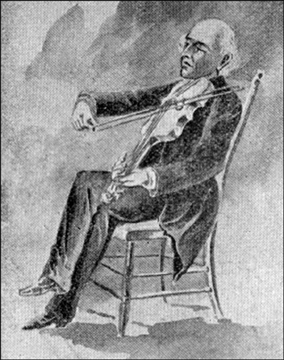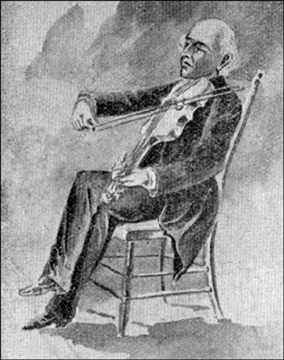Prior to 1840, political campaign music was immensely in vogue with local voters because it added a new exciting facet to the gatherings. However, beginning that year, the music fell into disfavor until its use was revived for the campaign of 1860. Its newfound popularity was credited for sparking enthusiasm throughout the north to bring Abraham Lincoln to the presidency.
After the 1860 election, music once again fell into disuse. Although campaign songbooks continued to be popular and circulated to the masses, there was less picking, singing and bowing at political stumps and rallies.
The seesaw scenario cycled again in 1886 when two Tennessee brothers, Bob and Alf Taylor, made state history by competing against each other for governor of the state in a spirited contest known as the “War of the Roses.” Both men were accomplished fiddlers and employed music to energize their campaigns and their audiences.

Robert L Taylor undoubtedly aided himself in his canvass for Governor when he developed the curious habit of carrying his fiddle to meetings and entertaining audiences with renderings of popular tunes. Even his critics could be observed discretely tapping their toes to a lively fiddle tune such as “Old Joe Clark.”
Bob Taylor became known as the fiddling governor, but he obviously possessed other leadership qualities since he was thrice elected to the governorship and became a U.S. Senator in 1907. Several years prior, Taylor defeated Congressman Augustus Herman Pettibone who was a classical scholar and one of the ablest Republicans of that era. Bob’s ridicule, stories and spoof were considerably over the top for the always-serious politician.
On one occasion, Augustus, a Carpetbagger (a Northerner who went to the South after the Civil War for political or financial gain) scoffed at his competitor as a mere fiddler who was trying to break into Congress. The next day, Bob brought his fiddle and a carpetbag (a traveling bag appropriately made of carpet fiber), arrayed them on the platform and asked the audience which they preferred to follow. The crowd applauded heartily.
At night, Bob attended country dances and furnished music for the ever-growing crowd, charming them with such selections as “Molly Hare,” “Polly, Put the Kettle On and “Rare Back Davy.” Republicans from that East Tennessee district deserted Pettibone and supported his admired competitor, electing him by over a thousand votes.
Pettibone’s rhetoric and sophistry were not vote catchers like Bob’s pastoral fiddle and charming eloquence. During one gathering, Bob brought his zealous crowd to an elevated pitch of merriment and enthusiasm by one of his incomparable anecdotes. When his challenger arose to reply, he said to the large crowd, “I will not attempt to excite your ‘risibles’.” At this juncture of the speech, a nearby countrified Republican asked a bystander what he meant by “risibles” and was told that it meant “laughter.” The old man promptly responded, “Then why didn’t he say so.”
Bob’s fiddle was obviously a love of his life. Once, during a speech, he described what he deemed to be the key to happiness: “A nice farm of 75 acres about five miles from a small town with a clear stream of water traversing its entire length, a smokehouse in the rear of the house tilled with fine meat, a barn with a pair of good coachers (large, closed, four-wheeled carriages with an elevated exterior seat for the driver) and a saddle horse, a springhouse, four or five peacocks, a drove of geese and ducks to sport in the stream and a quaint little orchard of productive trees.
Every Saturday, the former governor saddled his horse and rode into town to buy the weekly newspaper. Here he met two or three friends in front of the corner grocery where they chewed tobacco and swapped yarns. One would surmise that Bob always had his fiddle with him
